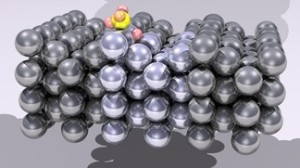Dec 19 2013
Today, the Federal Councilor Johann Schneider-Amman has unveiled eight new National Centers of Competence in Research (NCCR), which will receive substantial funding from the Swiss National Science Foundation. The "MARVEL" project, managed by EPFL and dedicated to developing innovative materials using powerful computer simulations, was one of the winning submissions.
 © 2013 EPFL
© 2013 EPFL
EPFL will be the linchpin of MARVEL, a new National Center of Competence in Research (NCCR). Johann Schneider-Ammann, Head of the Federal Department of Economic Affairs, Education and Research, announced this Tuesday in Bern the names of the eight winning projects out of nearly seventy candidates. The Swiss National Science Foundation (SNSF) will grant nearly 18 million francs over a 4 years period to this new project led by EPFL, renewable twice. EPFL, as well as the rest of the partner institutions, has committed to complete the funding.
Simulating and testing before producing
The new NCCR will be led by Professor Nicola Marzari and will aim to trigger a revolution in the field of materials design and discovery. “At this point, the power of supercomputers combined with our knowledge of quantum mechanics allow us to imagine innovative materials and simulate their characteristics and behavior without having to first create them in the lab, he said. In this manner, we can progress much faster than we used to, avoiding costly trial-and-error efforts.”
The development of novel materials will attract many players in various domains, starting with the energy industry. “Breakthroughs are required in order to harvest energy, convert it, and store it in an efficient and economically viable manner," continued Nicola Marzari.
And this is not all: advanced and consumer electronics, basic science and experimental research, and even the pharmaceutical industry need materials’ understanding and innovation. The Nobel prizes on graphene and on high-temperature superconductivity are good examples of new science coming from newly discovered materials. "Last, do not forget that all of electronics would not exist had we not started by understanding and engineering a material - silicon," explained the scientist.
MARVEL’s approach for designing and developing new materials will allow to accelerate research in this field at the same speed as the progress in computing. "Currently, the Piz Daint (CSCS) Swiss supercomputer can analyze 500 materials per minute. According to Moore's Law, which forecasts a doubling of computers’ capacity every 14 months, we will be analyzing 500’000 materials per minute by the end of the NCCR program in 2026. "
Harvesting of skills
In order to move beyond the simulation stage and direct its research towards practical applications, MARVEL has assembled the best talent found across the entire country. In addition to EPFL, the partnership includes researchers from ETH Zurich, the universities of Geneva, Basel, Fribourg, Zurich and Svizzera Italiana (the Italian speaking part of Switzerland,) IBM Zurich and the Swiss National Supercomputing Centre CSCS; experimental synthesis and characterization of the new materials will be in the hands of the Paul Scherrer Institute and the Swiss Federal Laboratory for Materials Science and Technology (EMPA).
Therefore, the researchers working for this new NCCR – more than twenty group leaders – will cover the entire national territory. "Europe, and Switzerland in particular, are world leaders in the areas of materials’ simulations. So, we had all the necessary skills in our research portfolio to guarantee a smooth and successful running - probably one of the reasons behind the success of our submission," suggested Nicola Marzari.